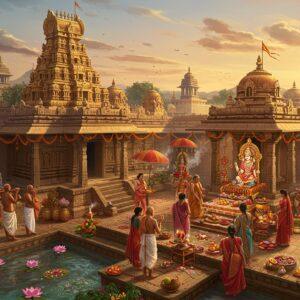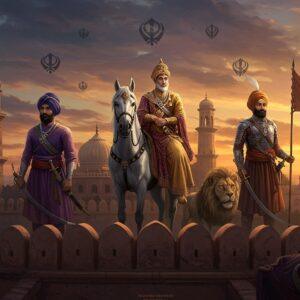
India, a land of vibrant diversity, boasts a rich heritage of traditions and customs, deeply rooted in religion, social norms, and family values. This exploration delves into the various facets of Indian culture, offering insights into the practices that shape the lives of millions.
A Warm Welcome: Traditional Greetings
Greetings in India go beyond mere pleasantries; they are expressions of respect and reverence. The most common greeting, Namaste, involves joining one’s palms together with a slight bow, signifying a recognition of the divine within each individual. This gesture translates to “I bow to the divine in you,” encapsulating the spiritual essence of Indian culture. Beyond Namaste, diverse communities offer unique salutations, reflecting the country’s multifaceted nature. Sikhs greet with “Sat Sri Akal,” Muslims with “Adaab,” and Tamilians with “Vannakkam,” each carrying its own cultural significance.
Poojn.in offers a wide selection of traditional clothing and accessories to help you embrace these customs. Discover beautiful sarees, kurtas, and jewelry that reflect the rich heritage of India. Visit poojn.in today!
The Elegance of Traditional Attire
Indian clothing is a vibrant expression of cultural identity, varying across regions, climates, and traditions. Women often grace themselves in colorful silk sarees, each region showcasing unique styles and draping techniques. These garments, more than just fabric, symbolize grace, elegance, and a connection to ancestral heritage. Men commonly wear the dhoti, an unstitched cloth draped around the waist and legs, or the kurta, a loose, knee-length shirt offering comfort and style. For special occasions, men may opt for the regal sherwani or achkan, long coats often adorned with intricate embroidery, signifying celebration and tradition. The Sikh turban stands as a powerful symbol of faith and identity.
Complete your traditional look with authentic jewelry from Poojn.in. We offer a wide variety of bangles, necklaces, and mangalsutras. Explore our collection at poojn.in.
Symbols and Rituals: Expressions of Faith and Devotion
Indian culture is deeply intertwined with symbolic gestures and rituals that hold profound meaning. The tilak, a mark applied to the forehead, often using kumkum (red vermilion) or chandan (sandalwood paste), signifies blessings and auspiciousness, commonly seen at the commencement of Hindu rites and ceremonies. The bindi, a decorative mark worn by women on their foreheads, traditionally signifies marital status. The mangalsutra, a necklace of black beads worn by married women, akin to a wedding ring, symbolizes the bond of marriage and is believed to protect the husband’s well-being. The aarti, a devotional ritual involving lamps filled with ghee or oil, illuminates homes and temples, creating an atmosphere of reverence. Fasting (Vrat/Upvas), practiced across various religions, serves as a form of devotion, gratitude, and self-purification.
Find all your puja needs at Poojn.in. We offer a complete range of puja items, including kumkum, chandan, diyas, and incense. Shop now at poojn.in.
The Art of Dining: A Shared Experience
Dining in India is a cultural experience that emphasizes sharing and respect. Traditionally, meals are enjoyed using the right hand, as the left is considered unclean. Sharing dishes is a common practice, fostering a sense of community, although sharing cutlery is avoided. Expressing appreciation for the food is a sign of respect for the host’s efforts. This communal approach to dining strengthens bonds and reflects the importance of togetherness in Indian culture.
Create a beautiful and traditional dining setting with Poojn.in’s selection of tableware and serving dishes. Visit poojn.in to explore our collection.
Reverence for Elders: A Cornerstone of Indian Values
Respect for elders is deeply ingrained in Indian culture. Touching the feet of parents, grandparents, teachers, and other respected figures is a common gesture of reverence, symbolizing humility and seeking blessings. This practice underscores the importance of honoring wisdom, experience, and the role of elders in guiding younger generations. This tradition strengthens family bonds and reinforces the values of respect and gratitude within the community.
Festivals and Celebrations: A Kaleidoscope of Culture
India’s diverse religious landscape gives rise to a multitude of festivals, each celebrated with unique fervor and tradition. Hindus celebrate Diwali, the festival of lights; Holi, the festival of colors; and Makar Sankranti, marking the harvest season. Muslims observe Eid, a time of prayer and feasting. Sikhs celebrate Baisakhi, their harvest festival, while Jains commemorate Mahavir Jayanti, the birth anniversary of Lord Mahavira. Buddhists honor Buddha’s birthday with reverence. These festivals, often accompanied by vibrant music, dance, and traditional cuisine, serve as important cultural touchstones, bringing communities together and reinforcing shared values.
Find everything you need for your festival celebrations at Poojn.in. We offer a wide selection of decorations, puja items, and gifts. Shop now at poojn.in.
Religion and Spirituality: A Way of Life
Religion is an integral part of Indian life, influencing daily routines, customs, and social interactions. Hinduism, Islam, Christianity, Sikhism, Buddhism, and Jainism are among the major religions practiced in India. Temples, mosques, churches, gurudwaras, and other places of worship serve as spiritual centers, fostering community and offering solace. Pilgrimages to sacred sites hold deep significance for many, strengthening faith and connecting individuals to their religious heritage.
Poojn.in provides a wide array of religious items and supplies to support your spiritual practices. Browse our collection of idols, puja kits, and other essential items at poojn.in.
Unique Customs: A Glimpse into India’s Diversity
Beyond the widely recognized traditions, India also harbors a fascinating array of unique customs that reflect its regional and cultural diversity. Frog weddings, performed to appease rain gods, highlight the close relationship between nature and tradition. Fire-walking rituals, such as Thimithi in Tamil Nadu, demonstrate devotion and spiritual strength. Baby tossing, practiced in Maharashtra and Karnataka, is a ritual believed to bring good luck to the child. These customs, often rooted in ancient beliefs and practices, offer a glimpse into the complex and fascinating tapestry of Indian culture.
Embracing Tradition in a Modern World
As India progresses in the modern era, technology plays an increasing role in preserving and celebrating its rich cultural heritage. Online platforms, like poojn.in, provide access to traditional clothing, festival essentials, and spiritual resources, connecting Indians worldwide with their roots. This harmonious blend of tradition and modernity ensures that cultural practices remain vibrant and accessible to future generations.
Poojn.in is proud to support the preservation of Indian traditions. Visit poojn.in to explore our wide range of products and services.
FAQs: Understanding Indian Culture
What is the significance of cows in Indian culture? Cows are revered as sacred animals in Hinduism and are often associated with motherhood and nurturing. They are protected and respected, and their products, such as milk and ghee, are integral to many religious rituals. This reverence reflects the deep respect for life that permeates Indian culture.
What are some common Indian wedding traditions? Indian weddings are vibrant celebrations filled with elaborate rituals, music, dance, and feasting. Ceremonies like Mehendi (henna application), Sangeet (musical gathering), and Haldi (turmeric ceremony) precede the main wedding ceremony. The exchange of garlands and the seven vows around the sacred fire symbolize the couple’s commitment. These traditions vary across regions and communities, showcasing the diversity within Indian culture.
For all your wedding needs, visit Poojn.in. We offer a wide range of traditional wedding items, from clothing and jewelry to puja supplies and decorations. Shop now at poojn.in.


